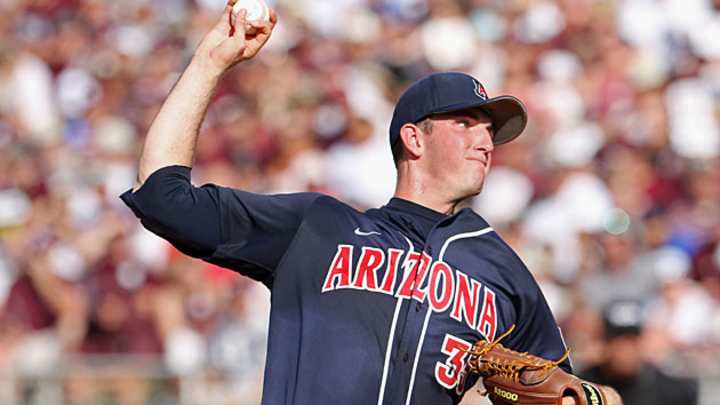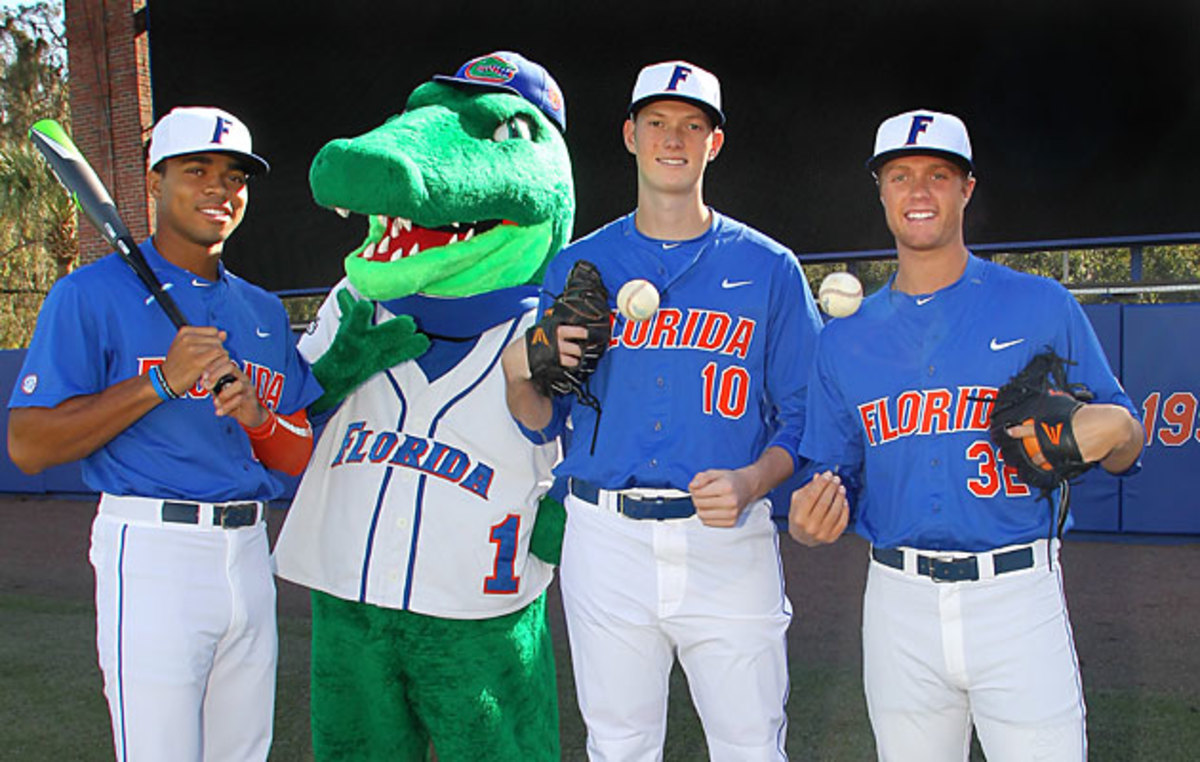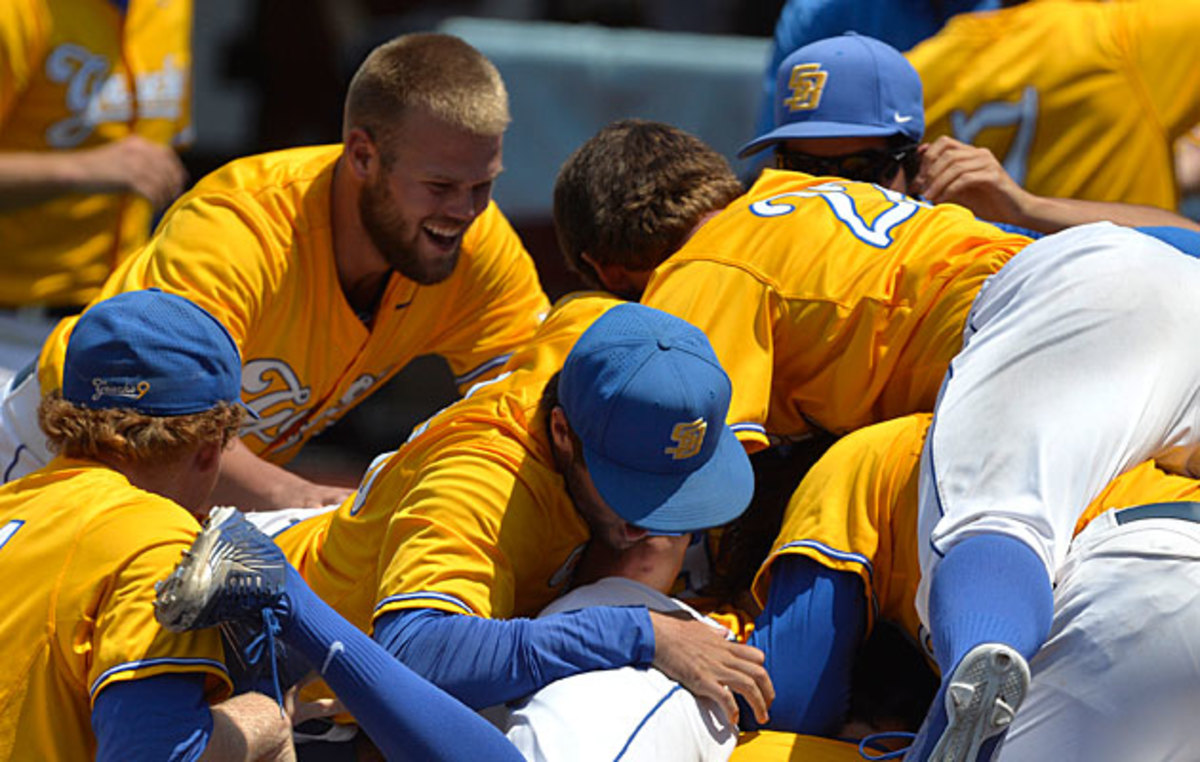College World Series: Schedule, TV, bracket and what to look for in Omaha

Your teams. Your favorite writers. Wherever you want them. Personalize SI with our new App. Install on iOS or Android.
Two weekends of unpredictable, entertaining postseason baseball have produced a 2016 College World Series field that spans the country, a testament to the chaos that claimed several ACC and SEC powerhouses in the early rounds. Just eight teams remain in the wide-open race for the national championship, and they all take the field at TD Ameritrade Park in Omaha for the first time this weekend, starting with two of the main party-crashers, UC Santa Barbara and Oklahoma State, on Saturday afternoon.
The tournament is split into two, four-team double-elimination slates; the teams that emerge from each bracket will play a best-of-three series for the national title starting June 27. Below is a look at the schedule, followed by a primer on the eight teams still striving to reach college baseball’s mountaintop.
Saturday, June 18
Game 1: UC Santa Barbara vs. Oklahoma State, 3 p.m. ET, ESPN2
Game 2: Miami (Fla.) vs. Arizona, 8 p.m. ET, ESPN2
Sunday, June 19
Game 3: Texas Tech vs. TCU, 3 p.m. ET, ESPNU
Game 4: Florida vs. Coastal Carolina, 8 p.m. ET, ESPN2
Monday, June 20
Game 5: Loser of Game 1 vs. Loser of Game 2, 2 p.m., ESPNU
Game 6: Winner of 1 winner vs. Winner of Game 2, 7 p.m., ESPN
Tuesday, June 21
Game 7: Loser of Game 3 vs. Loser of Game 4, 5 p.m. ET, ESPN2
Game 8: Winner of Game 3 vs. Winner of Game 4, 9 p.m. ET, ESPN
Wednesday, June 22
Game 9: Winner of Game 5 vs. Loser of Game 6, 7 p.m., ESPN
Thursday, June 23
Game 10: Winner of Game 7 vs. Loser of Game 8, 8 p.m., ESPN
Friday, June 24
Game 11: Winner of Game 6 vs. Winner of Game 9, 3 p.m., ESPN2
Game 12: Winner of Game 8 vs. Winner of Game 10, 8 p.m, ESPN
Saturday, June 25
Bracket 1 final, if necessary
Bracket 2 final, if necessary
Finals
Game 1: Monday, June 27, 7 p.m., ESPN
Game 2: Tuesday, June 28, 8 p.m., ESPN
Game 3: Wednesday, June 29, 8 p.m. ET, ESPN (if necessary)
• How do 2016 Cubs stack up so far against best teams in MLB history?
And here are the eight teams, presented in alphabetical order.

Arizona Wildcats (44–21)
How they got here: The Wildcats have been road warriors. They worked through the loser’s bracket to take down regional hosts Louisiana-Lafayette in the tournament's opening weekend, then edged Mississippi State in Starkville with a pair of one-run wins in the Super Regionals. Cesar Salazar’s 11th-inning walk-off single in a 6–5 Game 2 win made the Wildcats the first team to secure a spot in Omaha.
Player to watch: How first-year coach Jay Johnson deploys No. 1 starter Nathan Bannister will have a ripple effect on the rest of the pitching staff. Bannister has made three starts and thrown 284 pitches already this tournament, and his shaky outing in the second game of the Super Regional was salvaged by Arizona's late-inning comeback. College baseball fans and people for the ethical treatment of pitchers alike will be watching his workload closely.
Did you know: Due to rain delays, the Wildcats had to play four games in roughly 48 hours to make it out of the Lafayette Regional. Pushed one loss from elimination by a 10–3 loss at the hands of the Ragin’ Cajuns on June 5, Arizona edged Sam Houston State later that evening and then beat Louisiana-Lafayette in both games of a second consecutive doubleheader the next day to move on.
Omaha outlook: Who’s brave enough to completely dismiss the Wildcats' chances at this point? They will be outmanned at some point in the bracket, but that doesn't mean they'll be knocked out.
Coastal Carolina Chanticleers (49–16)
How they got here: The Chanticleers were on the lucky end of two of the tournament’s wildest finishes so far as they dispatched perennial powers in their home stadiums during each of the first two rounds. A mid-inning overnight rain delay set the stage for a four-run ninth and a comeback win over NC State in the final game of the Raleigh Regional on June 7. Five days later, with a chance to close out a stunning Super Regional sweep of LSU, Coastal coughed up a 3-2 lead in the top of the ninth only to walk off in the bottom half on junior shortstop Michael Paez’s RBI chopper over third base, clinching the program’s first CWS bid.
Player to watch: Senior closer Mike Morrison is not just a ninth-inning specialist—in fact, he averages nearly two innings per appearance, which makes his 1.06 ERA all the more impressive. A 27th-round pick by the White Sox, Morrison worked 3 2/3 perfect innings for his first save of the postseason in the Regional round and went another three innings to hold off LSU in the first game of the Super Regional. That flexibility is key in Omaha, and if the Chanticleers scratch out a lead by the sixth inning, they will look to him to take them all the way home.
Did you know: “The Chanticleer is a proud and fierce rooster that dominates the barnyard,” per the school’s official website. The distinctive nickname comes from a character in Chaucer’s Canterbury Tales and was originally adopted by the school’s athletics program to align more closely with the University of South Carolina’s gamecock mascot when Coastal Carolina was a branch school of USC. Also, it is pronounced SHON-ti-clear.
Omaha outlook: Even a hard-fought 0–2 record in Omaha would probably be remembered as a respectable showing outside of Myrtle Beach, but the Chanticleers are too confident and have come too far this month to set the bar that low. They will play spoiler to at least one of the heavy hitters on their side of the bracket.
• Subscribe to get the best of Sports Illustrated delivered right to your inbox
Florida Gators (52–14)
How they got here: After being pushed to the brink of elimination by Florida State with a 3-0 loss in Game 1 of the Super Regionals, the Gators started to play like the No. 1 national seed they are, shutting out the Seminoles on back-to-back days to clinch their fifth trip to Omaha in the last seven seasons. A grand slam off the bat of sophomore designated hitter J.J. Schwarz put an exclamation mark on the 7-0 win in the decisive Game 3, but it didn’t hurt that junior first baseman Peter Alonso, the team’s leader in almost every offensive stat category, went 5-for-8 with three doubles and a solo home run over the final two contests in Gainesville.
Player to watch: Florida will start a Golden Spikes Award finalist in junior righthander Logan Shore in its CWS opener against Coastal Carolina and follow him up with sophomore Alex Faedo, who is one of three pitchers in the nation to win 13 games this season. But the program’s latest bid for its elusive first national title hinges on how much it gets from junior lefthander A.J. Puk, the towering strikeout artist whom the Athletics made the sixth pick in this month's MLB draft. Puk lasted just 4 1/3 innings in a tight win over UConn during the first weekend of tournament play, then walked six batters in another short start in the clinching win over Florida State. Gators coach Kevin O’Sullivan will do all he can in throwing his other two would-be aces early, but Puk will need to deliver when called upon.

Did you know: No national No. 1 seed has won it all since Miami in 1999, and only twice has the top seed even reached the final since the tournament format was tweaked to include a three-game championship series in 2003 (in both instances, '04 and '09, Texas was the top seed that came up short).
Omaha outlook: With only two other regional top seeds in town, Florida deserves to be the favorites, but its lineup can get a little top-heavy, and a surprise trip to the loser’s bracket at any point in the first week threatens to throw its pitching staff off schedule. This was the Gators' season, but it might not be their tournament.
• Why one college baseball player chose love over hate after a mass shooting
Miami (Fla.) Hurricanes (50–12)
How they got here: The Hurricanes won three tight games in the regional they hosted in Coral Gables, including two one-run wins over Long Beach State. Matched up with ACC foe Boston College in the next round, they tallied a season-high five runs off first-round pick Justin Dunn for a 12–7 win in the first game, then cruised to a 904 win in Game 3 that clinched their second consecutive CWS trip and 25th in school history.
Player to watch: Catcher Zack Collins, whom the White Sox took with the 10th overall pick in this year's draft, is the heartbeat of Miami's offense and one of the best hitters in the country. He leads the team in home runs (15), on-base percentage (.538) and slugging percentage (.649).
Did you know: Junior leftfielder Jacob Heyward, one of four Hurricanes to have started every game this season, is also the younger brother of Chicago Cubs star Jason Heyward.
Omaha outlook: Miami arrives in Omaha with the field’s most complete team and the best chance to win it all, even if it will have to go through a higher-seeded in-state rival to do it.
Oklahoma State Cowboys (41–20)
How they got here: The Cowboys join UC Santa Barbara as the only teams not to have lost a game thus far in the tournament. Oklahoma State went 5-0 in two trips through the state of South Carolina in the opening rounds. First they routed the competition at the Clemson Regional, beating Nebraska 6-0 and then taking out the Tigers with convincing 12-2 and 9-2 wins. The following weekend the Cowboys crossed the Palmetto State and held South Carolina's offense to a total of just two runs in a series sweep.
Player to watch: Junior first baseman Dustin Williams has 14 home runs this season—eight more than any other player on the team—but he hasn’t left the yard since May 20, during the Cowboys’ final regular season series against Kansas. Oklahoma State hasn’t needed his extra-base pop to move through the early rounds of the tournament, but the expansive ballpark and big stage in Omaha demand that offenses focus on what they do best, and going deep is Williams' calling card.
Did you know: Cowboys coach Josh Holliday, who was an assistant coach at Vanderbilt when the Commodores made their first Omaha trip in 2011, is the older brother of St. Louis Cardinals outfielder Matt Holliday.
Omaha outlook: OSU's offensive firepower and well-rested pitching staff make it a dark horse national champion pick worth monitoring, although its road through the CWS bracket will get rocky in a hurry even if it wins its opener against upstart UCSB.
TCU Horned Frogs (47–16)
How they got here: TCU is in Omaha for a third consecutive season after ousting Texas A&M in a Super Regional for the second year in a row, although the Horned Frogs managed to avoid last year’s extra-innings theatrics. Junior starter Brian Howard allowed just two hits and struck out eight over seven innings in the deciding 4–1 win, one week after he struck out nine over eight innings in TCU’s victory against Arizona State to capture the Fort Worth Regional title.
Player to watch: Freshman designated hitter Luken Baker cuts an imposing figuring at 6’ 4” and 245 pounds, and his recent offensive performance has been similarly eye-catching. He is 24-for-44 at the plate with five home runs since the start of the Big 12 tournament just over three weeks ago, and his three-run blast in TCU’s first game against Texas A&M set the tone for the series.
Did you know: Baker can pitch, too. He was the Horned Frogs’ Friday night starter for the first half of the season until a muscle strain in his arm forced coach Jim Schlossnagle to pull him off the mound indefinitely. Nevertheless, his 1.70 ERA and .213 opponents’ batting average lead the team’s eight pitchers who have started at least one game this season.
Omaha outlook: Texas A&M won the toughest conference tournament in the country and waltzed through their regional, and then TCU came into College Station and beat the Aggies handily twice in three days. The Horned Frogs are playing their best ball of the season at the perfect time, and they shouldn’t be afraid of anyone who might stand in the way of the program’s first national title in the next two weeks.
Texas Tech Red Raiders (46–18)
How they got here: The Red Raiders eliminated feisty Dallas Baptist on their second try to advance out of the regional they hosted, then came back after dropping the first game of the Super Regional to East Carolina by winning two in a row to move on. Senior first baseman Eric Gutierrez led the charge: His two-run single in the 13th inning broke a 1–1 tie in Game 2, and he reached base in all five plate appearances the next day as Texas Tech rolled, 11–0.
Player to watch: Leadoff hitter Stephen Smith’s patience has been on display this month—he has drawn 11 walks in seven tournament games—but it is his power that has the potential to round out the Texas Tech offense in Omaha. A 10th-round pick by the Diamondbacks this year, Smith hit the go-ahead solo shot in a regional win over New Mexico, but he has otherwise been resigned to the role of table-setter. He can put pressure on opposing pitchers before they get to Gutierrez and the rest of the bats in the heart of the Red Raiders' order.
Did you know: The last time Texas Tech reached the College World Series, in 2014, its first opponent in Omaha was TCU, the same team the Red Raiders will square off with in their CWS opener on Sunday. Texas Tech, which will be looking to avenge a 3–2 loss from that game two years ago, has had more recent success against the Horned Frogs, beating them twice in a three-game series from April 29-May 1 in Fort Worth.
Omaha outlook: The Red Raiders bumped right up against their margin for error in each of the first two rounds in Lubbock, and someone has to go two-and-’cue on this daunting half of the bracket. With a pitching staff that has lost control of two games already this postseason, Texas Tech should be on high alert.

UC Santa Barbara Gauchos (42–18)
How they got here: Magic? The Gauchos’ storybook run to their first College World Series started with a walk-off home run by sophomore Austin Bush in the 14th inning of their first tournament opener, giving UCSB a 4-3 win over Washington. The Gauchos then beat Xavier twice, getting out of the Vanderbilt Regional without ever having to face the defending national champion Commodores, and then knocked off national No. 2 seed Louisville in the Super Regional opener. That set the stage for the most memorable moment of the tournament to date, when freshman Sam Cohen came off the bat to face the Cardinal's All-America closer and first-round pick Zack Burdi, with the bases loaded and UCSB trailing 3-0 in the ninth inning. Cohen promptly lined a pitch over the wall in rightfield for a grand slam that capped a stunning sweep of Louisville. The Gauchos entered the tournament considered a possibility to go home without winning a single game. Instead, they are going to Omaha and haven't lost yet.
Player to watch: Bush has 11 home runs this year, but he is the only UC Santa Barbara hitter with more than five. As the Gauchos search for consistent offense, the heat is on sophomore shortstop Clay Fisher, who has six doubles in his last four games and a hit in every game this tournament, to keep up his strong play.
Did you know: No. 1 starter Shane Bieber threw four complete games this year, more than any other pitcher still standing. Bieber has gone at least seven innings in 14 of his 17 starts.
Omaha outlook: It shouldn’t be hard for neutral fans at TD Ameritrade Park to throw their weight behind the Gauchos, but UCSB just doesn’t have the pop at the plate to make a significant run.
